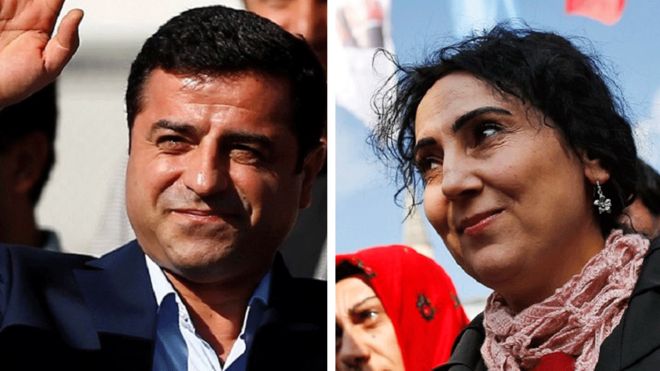
The two co-leaders of Turkey's pro-Kurdish opposition party have been detained along with other MPs.
Selahattin Demirtas and Figen Yuksekdag were detained at their respective homes as part of a counter-terrorism inquiry, security sources quoted by Anadolu news agency said.
At least nine other MPs from the People's Democracy Party (HDP) were also taken into custody.
Hours later, there were reports of a massive explosion in southeast Turkey.
Ambulances were sent to the scene of the blast in Diyarbakir, the city where Mr Demirtas was arrested.
Detentions 'unlawful'
Twitter, Facebook, YouTube and Whatsapp were reported to be inaccessible inside Turkey shortly after the detentions, even when users tried to circumvent restrictions using a virtual private network (VPN).
Mr Demirtas had tweeted about his arrest before the sites were restricted.
Another MP from the party who is currently abroad, Ertugrul Kurkcu, told the BBC that the detentions were "totally unlawful".
He said: "This crackdown tonight is nothing to do with procedural law, criminal law, any law whatsoever or the constitution. This is an unlawful hijacking of HDP parliamentarians.
"The Turkish government is heading towards a dictatorship of Nazi style [sic].
"Will the Turkish government abide by the internationally accepted standards of parliamentary democracy? This is the basic question."
Last month, the co-mayors of Turkey's largest Kurdish-majority city were detained, also as part of a terrorism investigation.
Turkey claims that the HDP has links to the Kurdistan Workers' Party (PKK), a militant group, but the party strongly denies this.
The PKK is deemed a terrorist organisation by the US, the European Union and Turkey.
Turkey remains under a state of emergency that was imposed after a failed coup in July. The emergency allows President Recep Tayyip Erdogan and his cabinet to bypass parliament when drafting new laws and to restrict or suspend rights and freedoms.
About 100,000 public sector employees with alleged links to the coup's alleged mastermind were subsequently purged from their jobs.
The HDP entered the Turkish parliament for the first time last year, when it won 59 seats and became the country's third-largest party.
It had done so after at least two people died in explosions at one of its rallies.
But just three months later, against a backdrop of rising violence between Turkish forces and the PKK, a crowd attacked the HDP's offices in Ankara.
The next day, Mr Demirtas accused the ruling party of orchestrating nationalist attacks.
Turkish politicians normally have immunity from prosecution, but this was removed from the HDP earlier this year.

0 comments:
Post a Comment